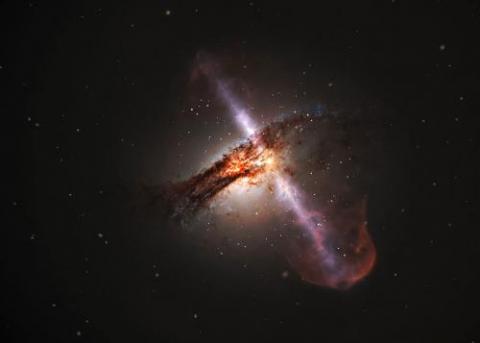Growing old together: a sharper look at black holes and their host galaxies

Some relationships are written in the stars. That’s definitely the case for supermassive black holes and their host galaxies, according to a new study from Yale University.
The “special relationship” between supermassive black holes (SMBHs) and their hosts — something astronomers and physicists have observed for quite a while — can now be understood as a bond that begins early in a galaxy’s formation and has a say in how both the galaxy and the SMBH at its center grow over time, the researchers note.
A black hole is a point in space where matter has been compacted so tightly that it creates intense gravity. This gravity is strong enough that even light can’t escape its pull. Black holes can be as small as a single atom or as large as billions of miles in diameter. The biggest are called “supermassive” black holes and have masses equal to that of millions — or even billions — of suns.
SMBHs are often found at the center of large galaxies, including our own galaxy, the Milky Way. Although SMBHs were theoretically expected to exist, the first observational hints were detected in the 1960s; earlier this year, the Event Horizon Telescope released the first silhouette of a black hole in the galaxy Messier 87. Astrophysicists continue to theorize about the origins of black holes, how they grow and glow, and how they interact with host galaxies in different astronomical environments.
“There has been a lot of uncertainty regarding the SMBH-galaxy connection, in particular whether SMBH growth was more tightly connected to the star formation rate or the mass of the host galaxy,” said Yale astrophysicist Priyamvada Natarajan, senior investigator of the new study, which appears in the journal Monthly Notices of the Royal Astronomical Society. “These results represent the most thorough theoretical evidence for the former — the growth rate of black holes appears to be tightly coupled to the rate at which stars form in the host.”
Read the full article by Jim Shelton on YaleNews via the external link below.
